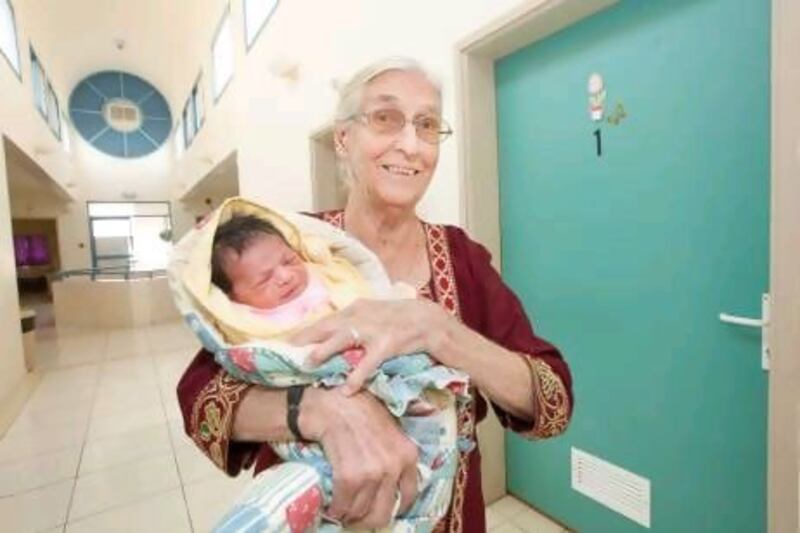FUJAIRAH // Wilhelmina van de Weg will not reveal how may children she has delivered. But people agree that every family in the emirate has a relative who has entered the world with the midwife's help.
Minie, or Muna as she is known to the Emirati community, and her friend Joan Elliot built the first maternity ward on the east coast in 1967.
The creation of the Fujairah Maternity Hospital and its daily life are now documented in the photo book Focus on Fujairah: Through Minie's Lense, 1964-2000. The book also documents Minie's travels on the east coast.
Hers was the only clinic from Musandam to Muscat. The region had almost no access to modern medicine and its people suffered from high rates of malaria, infant mortality and death during childbirth.
Joan and Minie, who met at the University of Glasgow, where they studied nursing and midwifery, were not only nurses, they were mechanics, electricians, dentists and builders. Joan left the Emirates in the 1970s due to ill health, but Minie still lives in the compound of the maternity hospital that they built.
"Fujairah wouldn't really exist if it wasn't for Minie," says Victoria Algate, the book's graphic designer and one four friends who convinced Minie to document her life.
Minie, who has a saint's modesty and a doctor's discretion, was born in Indonesia to Dutch parents. Initially, she refused to be part of the book, and said perhaps one day her friends could write down her memories and publish them after her death.
Then they discovered Minie's carefully guarded photo collection: about 1,700 snapshots from 1964.
The book begins with Minie and Joan's arrival by freighter in Dubai, from Casablanca.
The tome has little text; a short biography of Minie's life and a line or two attached to each photo. The captions were narrated by Minie to the other friends who helped create the book: Sheikh Abdullah bin Suhail Al Sharqi, a member of the Fujairah ruling family, the archaeologist Michele Ziolkowski, and Salam Baldwin Khoury.
Still spry at age 80, Minie brings the book to life when she flips through the pages for a guest. She can recall the family tree of each woman in the book, the dates of wadi floods that stopped overland travel for 12 days, and how men crowded onto the Land Rover "taxi" with goats and cargo below them, and chickens in palm-frond baskets on the side of the vehicle.
In a 1968 photo of a blind woman being helped onto a donkey by her granddaughter, the women are so slight that today one might mistake them for children.
"Now, this granddaughter, I don't know how many of her children we have already delivered," Minie says with evident pride.
Another photo captures the crowds of women outside the clinic one morning, sitting and squatting with their children. Some had gathered an hour before the clinic opened at 6am. It was a normal day, said Minie.
"You never [saw] them before, then you had to deal with them to deliver them," she says. "So at the end we tried to get them to come at least once [before delivery] so we can give them iron tablets.
"There was much malaria here at that time. And then when they came into labour I didn't know if the labour brought on the malaria or the malaria brought on the labour."
Minie and Joan treated everything from toothaches to backaches, receiving medical supplies annually from Sweden and Great Britain.
"It was very simple, iron tablets, things people needed most," says Minie.
Minie and Joan had learnt while working at clinics in Sharjah and Ras Al Khaimah that women who complained of backaches could often be "cured" with malaria tablets.
Word of the clinic in Fujairah spread up and down the coast and across the Gulf.
"The grapevine works very fast here," Minie says. "Even people in Iran had heard that our tablets helped. They thought it was pregnancy tablets. But it was just they were so anaemic they couldn't get pregnant."
The photographs are testimony to the physical and mental strength of the women, who are shown wearing loose, knee-length dresses, sometimes with trousers underneath. The pictures capture them at work, changing tyres, setting the foundations for a new clinic and checking generators.
The clinic was almost a charity operation - a delivery cost Dh55. But it was the sense of family that brought in Fujairah families.
"There are lots of government hospitals and private hospitals but at the same time people insist to come back to this place," says Sheikh Abdullah. "For lots of low-income people this project is most important. The main thing for us really, is that we hope it will continue after Minie."
Minie is still active at the clinic.
"Oh yes, I visit the babies twice a day to make sure they're OK," she says.





